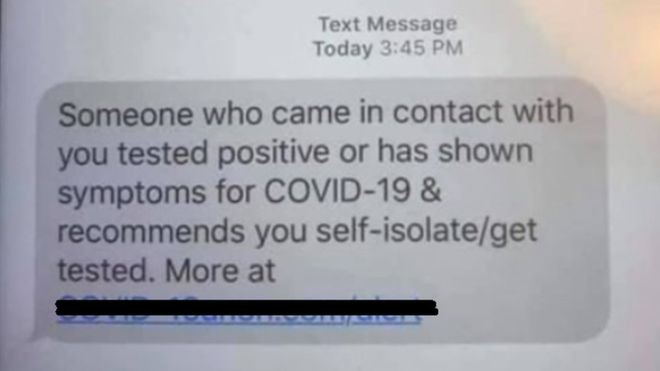Coronavirus contact tracing text and email scams: how to stay safe

The contact tracing app has not been released nationally, yet scammers are trying to trick people into sharing personal details. Here’s what to watch out for.
Brits have been warned of fake texts and emails hooked on the news of the contact tracing app, which are designed to steal the victim's personal information.
While the app isn't even up and running yet, it hasn't stopped criminals looking to scam people out of their money anyway.
Here's what to look out for and how to stay safe.
How the contact tracing app will work
The last couple of months have been difficult for millions of people in the UK, so the ongoing easing of the lockdown will be welcome by many.
A vital part of loosening the lockdown is the contact tracing app, which is expected to be launched later this month following a trial in the Isle of Wight in May.
This app aims to help stop the spread of coronavirus by asking people who were in close contact with those showing symptoms to self-isolate.
It will automatically notify those who have ‘high risk’ contact – but at the time of writing, contact tracing is only being done manually.
Coronavirus scams: fake 'Tesco' vouchers, dodgy tax refund emails & more
Contact tracing scams already circulating
The Chartered Trading Standards Institute (CTSI) has warned that people have received texts allegedly from contact tracers informing them they have come into contact with someone who has tested positive for COVID-19 or has symptoms.
Included in the text is a link to a bogus website that asks for personal information that can then be used by the fraudster to gain access to bank accounts or commit identity fraud.
An example of the scam is below:

"These texts are a way to steal personal data and may put the bank accounts of recipients at risk,” said Katherine Hart, lead officer at CTSI.
“If anyone receives texts or other kinds of messages like this, they should not click on any accompanying links, and report them to Action Fraud."
Fake Aldi 'free coupon' offer: scam voucher on WhatsApp, Twitter, Facebook and email
How to stay safe
This scam preys on people’s understandable fears about COVID-19, so the public may be more susceptible to this type of scam.
It’s worth stressing the NHS says even when the service is live official contact tracers from the service will never:
- Ask for bank details or payments
- Request details of any other accounts
- Ask you to set up a password or for your PIN over the phone
- Ask you to call a premium rate number
So, if you do get any of these requests, it’s a scam and you shouldn’t click on any links or call any numbers included in any suspicious communications.
It’s worth noting you may be contacted by email, text or phone from the Test and Trace service, but these texts will be from the NHS and won't contain links.
If they are unable to contact you, they will call you from 0300 013 5000. Of course, there's the danger of criminals using a number spoofing scam so if the person on the other line does start asking you for any of the above info hang up immediately.
At the time of writing, the NHS has said you’ll be asked to log into the Test and Trace contact tracing site by official tracers (which you will look up yourself).
Children under the age of 18 will be contacted by phone if possible and asked for their parent or guardian’s permission to continue the call.
Comments
Be the first to comment
Do you want to comment on this article? You need to be signed in for this feature